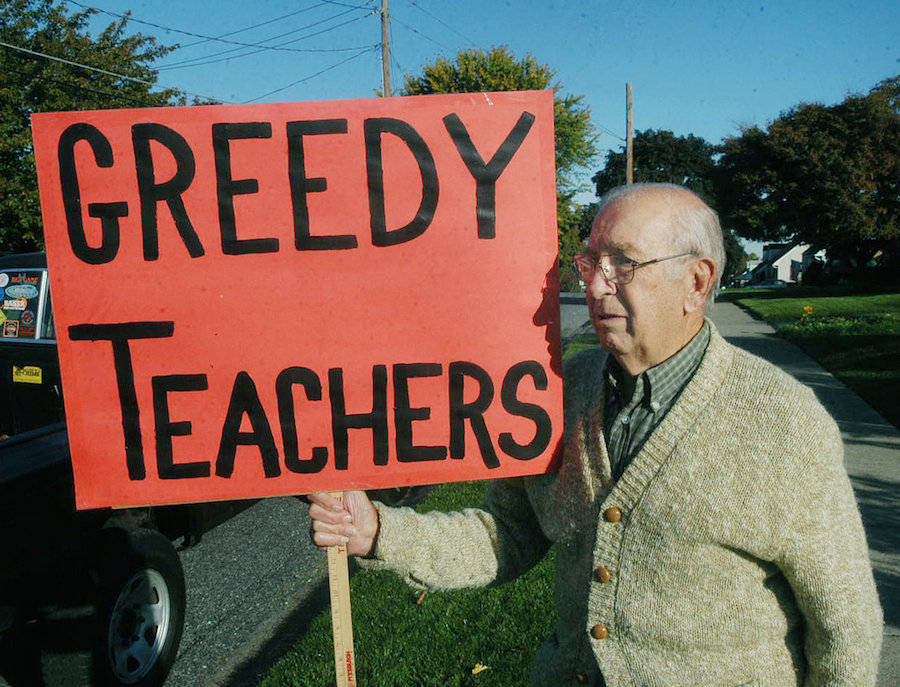A California Superior Court judge has gutted the state’s laws regarding teacher tenure and seniority protection, a devastating setback to the state’s powerful teacher lobby.
In a decision released Tuesday, Judge Rolf Treu cited Brown v. Board of Education and other cases to rule that the extremely strict rules limiting how teachers are hired and fired disproportionately impacted the state’s poor and minority students, thereby depriving them of their right to an equal education.
The current ruling is a preliminary one preceding a final ruling to be issued within a month. Treu has indicated that he will allow the law to remain in place pending an inevitable appeal to California’s Supreme Court.
The case, Vergara v. California, was filed in 2012 by nine public school students, who argued that three aspects of the state’s labor laws on teachers were unconstitutional. First, the state’s rule on tenure required the state to either grant or deny permanent employment to new teachers after only 18 months of experience. L.A. Unified School District Superintendent John Deasy was one of many who testified that the mandated timeframe was insufficient to evaluate the quality of new teacher hires.
Second, the lawsuit targeted the state’s rules on firing teachers, which made it nearly impossible to fire a teacher for bad performance once they had been given tenure. Out of 300,000 teachers in California, less than 100 have been removed from classrooms in the past decade, and firing a teacher can take years and cost millions of dollars.
Third, the lawsuit attacked the state’s seniority protections, which stated that any layoffs undertaken by the state’s schools must follow the “Last In, First Out” (LIFO) rule that eliminates teachers not based on need or ability but simply based on how long they had worked.
The combined effect of all these laws, the plaintiffs argued, was to fill California’s schools with thousands of incompetent teachers who were impossible to remove. These teachers were disproportionately assigned to low-income schools with high minority populations, thereby creating an unequal educational reality. This, they argued, violated the equal protection clause in the California constitution.
Judge Treu agreed, ruling that the state’s protections for incompetent teachers were excessive “uber due process” and that its LIFO rule amounted to an assertion that “the state has a compelling interest in the de facto separation of students from competent teachers, and a like interest in the de facto retention of incompetent ones.”
“The logic of this position is unfathomable and therefore constitutionally unsupportable,” Treu wrote in his opinion. Treu also observed that the state’s policies had created a “Dance of the Lemons,” a phenomenon in which grossly incompetent teachers who cannot be fired are simply transferred repeatedly from school to school to mitigate outrage. This phenomenon primarily affected poorer students, Treu wrote.
The ruling will almost certainly set off a firestorm of legislation in other states with similar laws, as California’s laws are not unique in granting extensive protections to teachers. The students in California were backed by a skilled legal team hired by the non-profit Students Matter, which is bankrolled by technology entrepreneur David Welch.
Students Matter has considered launching litigation in other states as part of a plan to drive reforms in education. It also plans to use the ruling to pressure California’s legislature to modify teacher tenure laws without waiting for litigation to conclude.
The state of California and its teachers unions argued that the measures of teacher effectiveness used by the plaintiffs were flawed, and that framing teacher interests as hostile to those of students was a false dichotomy. Strong protections for teachers helped students by allowing the state to attract and retain teaching talent, they maintained.
When the trial’s closing arguments wrapped up in March, American Federation of Teachers Randi Weingarten complained that the lawsuit represented the interests of “the elite and the wealthy” and that the true problem with California’s schools was a lack of funding.




